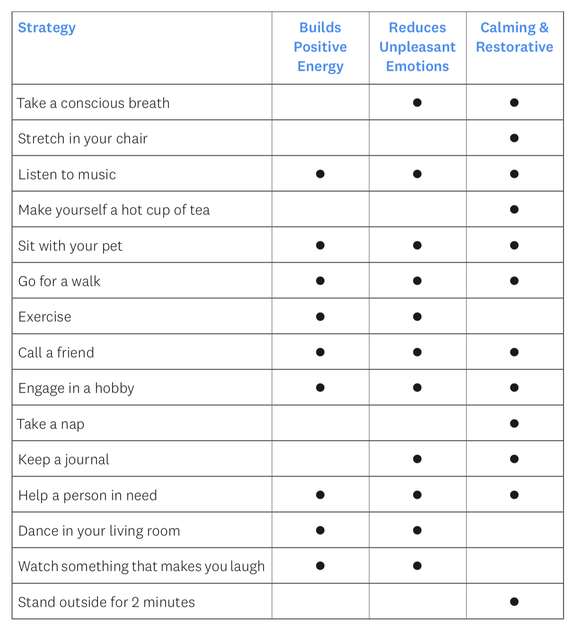Job Insecurity: The Emotional Road Ahead

Every Monday evening for the past seven weeks, I’ve laced up my athletic shoes to run repeats on a steep, quarter-mile hill in my neighborhood. What started as a bet with my 14-year old son has become a key strategy in my efforts to manage the emotions that come with the uncertainty of the COVID era. It’s miserably hard - every time - but when I’m done, I’ve discharged any anger or anxiety I felt earlier in the day. And I’m much nicer to be around at the dinner table.
Like you, I worry. A lot. On top of the threat of catching the virus, friends, colleagues and family members are losing their jobs in droves. To date, more than 30 million Americans have filed for unemployment and the layoffs keep coming. As the bills mount and uncertainty swells, so do our feelings of loss, despair, fear, anger, and downright panic.
So what can we do with these intense feelings? While we might have the inclination to avoid or suppress them, that won’t help in the long run. As we grapple with job insecurity, we need new skills to navigate an unpredictable future. The skills of emotional intelligence are a very practical way to deal with intensely unpleasant feelings.
The first skill to master is the ability to recognize your emotions. It sounds simple, but so often, we ignore what we’re feeling – until the emotion looms so large that it becomes unmanageable. By viewing emotions like anxiety, loneliness or worry as information, it’s easier to step into the role of an observer and identify its root cause.
A management consultant recently told me that it has been easier to explore the root cause of her emotions since she has gotten in the habit of checking her emotional state several times each day. For example: when she recognizes that she feels frustrated, she observes that the root case of frustration is a blocked goal. Knowing that allows her to take action and to move through the feeling. The result, she says, is a greater capacity to handle her emotional load at home and at work. Because of her new skills, she says “I feel bigger inside.”
The second skill is the ability to regulate the emotion you’re feeling so that you can meet your larger goals. A friend and her husband both lost their jobs within three weeks of each other and, unsurprisingly, she’s feeling sorrow and panic. She knows the source of those feelings: job loss and fear for her family’s well-being. Her long-held gratitude practice (a proven regulation strategy) is helping her shift emotionally, creating a sense of calm in place of the panic. This emotion regulation creates a lighter, more positive mindset that is helping her look for new opportunities, her most urgent goal. She recently told me, “I honestly feel energized & excited about creating what’s to come.”
To regulate effectively, it’s helpful to understand some of the science of emotion. Emotions like anger and fear are part of a human’s fight or flight response. As a hard-wired response to threat, our nervous system revs up, releasing a hormonal cocktail of adrenaline, cortisol, and norepinephrine. This cocktail narrows our thinking (hello tunnel vision!) and colors our perception of the world with a negative hue. In an emergency, this response serves us, but when it becomes a chronic condition, it has long lasting effects on our mental and physical well-being. It also prevents us from seeing the world in a wider frame, a frame in which we can explore solutions and new possibilities.
The fight or flight response generates energy in our bodies, and that energy needs to be discharged. That’s why I run that damn hill every Monday! Taking my fear and anger out on my neighborhood hill is more helpful than yelling, slamming doors or walking around with pursed lips saying, “I’m fine!” How do you discharge high unpleasant energy? You may prefer to go for a walk, do some downward dogs, or even dance in your living room. Whatever you choose, recognize that you’ve got to do something. Some emotions require motion. The uncertainty isn’t going away and therefore, neither are the emotions that go along with it.
To give you additional regulation ideas, I’ve pulled this chart from our Coping with Corona ebook. Take a look as see what you can enlist today to support you.

My daughter recently asked me, “Why don’t you put on headphones and listen to music when you run your hills?” I told her that I liked observing how my mind tries to convince me on every hill that I can’t make it while my legs prove that I can. To be clear, running hills or going for a walk will not make the fundamental problem of job insecurity disappear. That said, it can help you feel better, and that’s often the goal of using emotional intelligence skills. When your mood improves, so does your capacity to see a way through the obstacles you face.
The next time you’re stuck in a cycle of anxiety, anger or frustration, get up and do something that moves that unpleasant energy out of your system, whether that means taking a nap or running hills. You don’t have to wait until the emotion has had its way with you; you can change how you’re feeling. When you make that effort, you just might find that you’re left with a clearer mind, calmer mood and maybe just a little more hope.
Latest Posts
BACK TO HOME ❯ Developing New Managers? How to Set Them Up for Success
Developing New Managers? How to Set Them Up for Success
 First-time Managers Are Holding Back Employees & Performance
First-time Managers Are Holding Back Employees & Performance
 Why New Managers Fail and How Oji Foundations is Revitalizing Leadership Training
Why New Managers Fail and How Oji Foundations is Revitalizing Leadership Training
Sign up for our People-Powered Newsletter.
